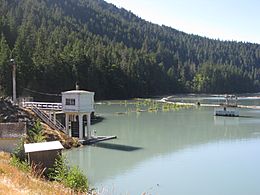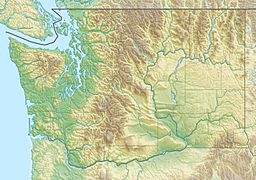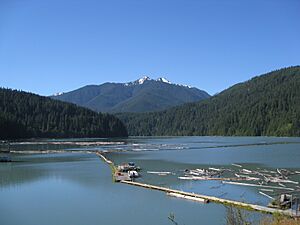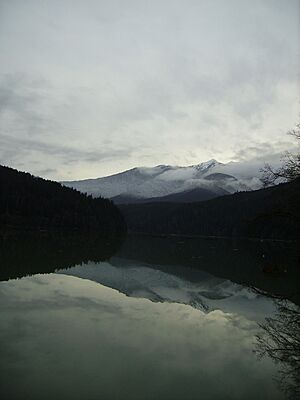Lake Mills (Washington) facts for kids
Quick facts for kids Lake Mills |
|
|---|---|

Lake Mills
|
|
| Location | Olympic National Park, Clallam County, Washington, US |
| Coordinates | 47°59′20″N 123°36′20″W / 47.98889°N 123.60556°W |
| Type | reservoir |
| Basin countries | United States |
| Surface elevation | 545 ft (166 m) |
Lake Mills was a large, man-made lake, also known as a reservoir, located in Olympic National Park in Washington, United States. It existed from 1927 until 2012. This lake was created by the Glines Canyon Dam on the Elwha River, about 13 miles from where the river meets the ocean on the Olympic Peninsula.
What Was Lake Mills?
Lake Mills was formed in 1927 when the Glines Canyon Dam was finished. Before the dam, this area was a lowland forest along the river. The trees were cut down to make way for the new lake.
The dam was built without any special ways for fish to pass through it. This meant that Pacific Salmon and other fish that travel from the ocean to freshwater to lay eggs (called anadromous fish) could not reach the upper 50 miles of the Elwha River watershed. This part of the river is inside Olympic National Park and was important for fish to live and reproduce.
Bringing the River Back to Life
A big project called the Elwha Ecosystem Restoration aimed to bring the Elwha River back to its natural state. As part of this project, the Glines Canyon Dam was removed in 2014.
The water in Lake Mills was fully drained by October 2012. After the water left, only a lot of sand and mud (called sediment) remained where the lake used to be. Crews from Olympic National Park are now working to replant the area. This helps the land recover faster and makes it a better home for salmon and other wildlife to return.
Fish That Lived in the Lake
While it existed, Lake Mills was home to different types of trout, including rainbow trout, bull trout, and Dolly Varden trout. These fish used the lake as their main home because the dam blocked their natural path to the Pacific Ocean.
Now that the dam is gone, scientists expect these fish to return to their natural way of life. This means they will be able to travel freely between the river and the ocean, just like their ancestors did before the dam was built.





